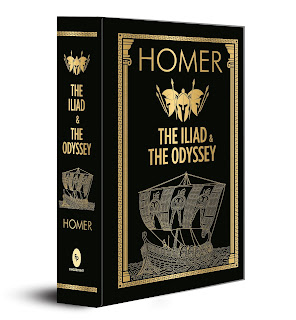ULYSSES – THE GREEK HERO -#BLOGCHATTERA2ZCHALLENGE2022
Ulysses or Odysseus was the hero of Homer’s epic poem
titled ‘The Odyssey’. He also played a significant role in ‘The Iliad’, also by
Homer. He was the son of Laertes and Anticlea, and supposedly the
great-grandson of Hermes, the messenger god of Olympus. He was married to the
beautiful and wise Penelope and had a son, Telemachus. He ruled over the
kingdom of Ithaca.
The legend goes that when Helen of Troy eloped with
Paris, the prince of Greece, her husband Menelaus, the king’s brother, called
all her suitors together to get her back. This step led to the Trojan War,
which is the theme of The Iliad.
In those days, it is believed that the gods often spoke
to humans through oracles. One such oracle prophesied that if Ulysses took part
in the Trojan War, he would spend years abroad before he finally returned home.
Ulysses had no intention of going to war, and hence, he pretended to be a
lunatic. He tethered together an ox and a donkey on to his plough and started
sowing salt on his fields. Agamemnon, the brother of Menelaus, saw through his
ruse. He ordered Palamedes to place the little son of Ulysses, Telemachus, in
front of the plough. When Ulysses swung the plough away, he revealed the fact that
he was as sane as anyone else.
Ulysses was one of the wisest and most influential Greek
champions. It was he, along with Nestor and Idomeneus, who kept the Greeks
together. He was always the man of reason, a clear-headed warrior known for his
wisdom and his diplomatic skills. The stratagem of the Trojan Horse was devised
by him, where a giant horse filled with Greek enemy soldiers was offered as an
offering to Goddess Athena and hence, allowed into the ramparts of Troy. In the
darkness of night, while the Trojans were celebrating, the Greek soldiers disembarked
from within the horse, and sacked the city of Troy which had held out for so
long. This clearly brings out the cunning of Ulysses.
The Odyssey was the saga of Ulysses’ trip home to Ithaca
which took ten long years, as prophesied by the oracle, and the adventures he
had on his way. He and his men were lost at sea and reached the island of the
Lotos-Eaters, from which they escaped. They were captured by the Cyclops,
Polyphemus, and entranced by the Goddess Circe and her Sirens. Their ship also
narrowly escaped the six-headed monster, Scylla, and the perilous whirlpool,
Charybdis.
After twenty long years, when he finally got home, the
Goddess Athena disguised him as a wandering beggar so that he could see what
was happening back home.
Penelope, his faithful wife, had been besieged by suitors,
and she had promised them that she would marry the one who could string her husband’s
bow. None of them could do so. Finally, Ulysses strung his bow, revealed
himself and slaughtered all the suitors, after which he lived happily
(hopefully!) ever after.
Alfred Tennyson wrote his famous poem ‘Ulysses’ in which
an aging Ulysses looks back at his life of adventure and seeks out his old
comrades “to sail beyond the sunset”. James Joyce also named his novel ‘Ulysses’
and created a protagonist, Leopold Bloom, who spent a day that mimicked Ulysses’
ten-year period of travelling.
An interesting book that I recently read is ‘The
Penelopiad’ by Margaret Atwood in 2005 that retold the story from Penelope’s
viewpoint.
Myriad films have been made on the Greek hero over the
years, the most popular ones having Ulysses played by Kirk Douglas (1955) in ‘Ulysses’,
John Drew Barrymore (1961) in ‘The Trojan Horse’, Piero Lulli (1962) in ‘The
Fury of Achilles’ and ‘Sean Bean’ (2002) in ‘Troy’.
I am participating in the #Blogchatter A to Z Challenge! Happy Reading and Writing! :)







I have been intending to read James Joyce’ ‘Ulysses’ for a long time now but never managed to pick it up. Maybe I will do it this year.
ReplyDeleteThanks for the movie references. Duly noted! :)
You're welcome, Priyanka! :)
DeleteGlad to know about this hero. You have written so beautifully. Liked the well written post. - Swarnali (The Saffron Storyteller)
ReplyDeleteThank you so much, Swarnali! I am glad that you enjoyed my post.
DeleteI love retellings from women character's PoV's and might just pick up ‘The Penelopiad’. Thanks for this interesting read, Deepti.
ReplyDeleteYou're always welcome, Manali! Thank you for taking the trouble to go through my posts. It means a lot.
DeleteBy sheer coincidence, my choice for U is Tennyson's Ulysses.
ReplyDeleteThat's great! I will go through your post with avid interest! :)
ReplyDeleteThank you Deepthi. Your post brought to my mind the bits and pieces of what I remembered from the textbook I learned once, as well the film I watched--The Troy.
ReplyDeleteThank you, Prasanna! I am happy that my post evoked memories!
Delete